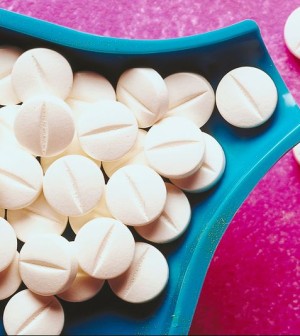- Could Your Grocery Store Meat Be Causing Recurring UTIs?
- Are You Making This Expensive Thermostat Error This Winter?
- Recognizing the Signs of Hypothyroidism
- 10 Strategies to Overcome Insomnia
- Could Artificial Sweeteners Be Aging the Brain Faster?
- Techniques for Soothing Your Nervous System
- Does the Water in Your House Smell Funny? Here’s Why
- Can a Daily Dose of Apple Cider Vinegar Actually Aid Weight Loss?
- 6 Health Beverages That Can Actually Spike Your Blood Sugar
- Treatment Options for Social Anxiety Disorder
Cholesterol Drugs May Speed Healing After Surgery


Recovery time after surgery may be reduced for patients taking the cholesterol-lowering medications known as statins, according to a new study.
The study’s Irish researchers suspect that the drugs may affect the body’s inflammatory response, reducing the amount of time surgical patients’ wounds need to heal. And that seemed to be particularly true among people who tend to have healing complications.
“Statins have become one of the most widely prescribed medications in the world. While they are typically used to manage high cholesterol levels, a number of researchers have been investigating the benefits of statins in other conditions, such as severe infections or following organ transplantation,” said the study’s lead author, Dr. Gerard Fitzmaurice, from Our Lady’s Children’s Hospital in Dublin, Ireland, in a news release from the Society for Thoracic Surgeons.
In conducting the study, the researchers analyzed existing data on statins, most of which was from lab-based studies involving animals. They found that statins reduced the amount of time needed to recover after surgery from about 19 days to 13 days, according to the study.
Statins could improve wound healing in patients who’ve underdone any type of procedure, including heart surgery, the researchers concluded. This could result in smaller scars, they pointed out.
“Normal wound healing involves a series of phases that ultimately leads to a scar. Many things can affect this process and it’s difficult to determine exactly how statins might improve wound healing, but it would appear that they influence a number of factors in the inflammatory response,” noted Fitzmaurice. “Our analysis also shows that some statins are better at it than others.”
Although the overall rate of chest wound infections is low — only about 1 percent — faster healing times might reduce this rate even further, especially for people with slow-healing wounds due to underlying health issues, such as diabetes.
“Based on the encouraging results in the systematic review, we would recommend consideration of an appropriately conducted, randomized-controlled, double-blind clinical trial to comprehensively assess the potential role of topical statins in the promotion of postoperative wound healing,” concluded Fitzmaurice.
More information
The U.S. National Institutes of Health provides more information on statins.
Source: HealthDay
Copyright © 2026 HealthDay. All rights reserved.










